Solutions
Customer Support
Resources
Contract review software is rapidly reshaping how legal and business teams manage contracts.
It's helping them review third-party agreements faster, flag risks with greater accuracy, and stay aligned with internal playbooks.
But to use AI contract review software successfully, you need to understand how it works, and before that, you need to choose the right tool. This deep-dive into contract review tools will give you everything you need to navigate this new technology with confidence.
Contract review software is a platform that helps legal and business teams streamline how they assess legal documents, validate terms, and negotiate changes, without sacrificing accuracy or oversight.
Rather than manually working through every clause line by line, the software can surface key provisions, flag non-standard language, and highlight risks that require attention or revision.
Here’s how it works:
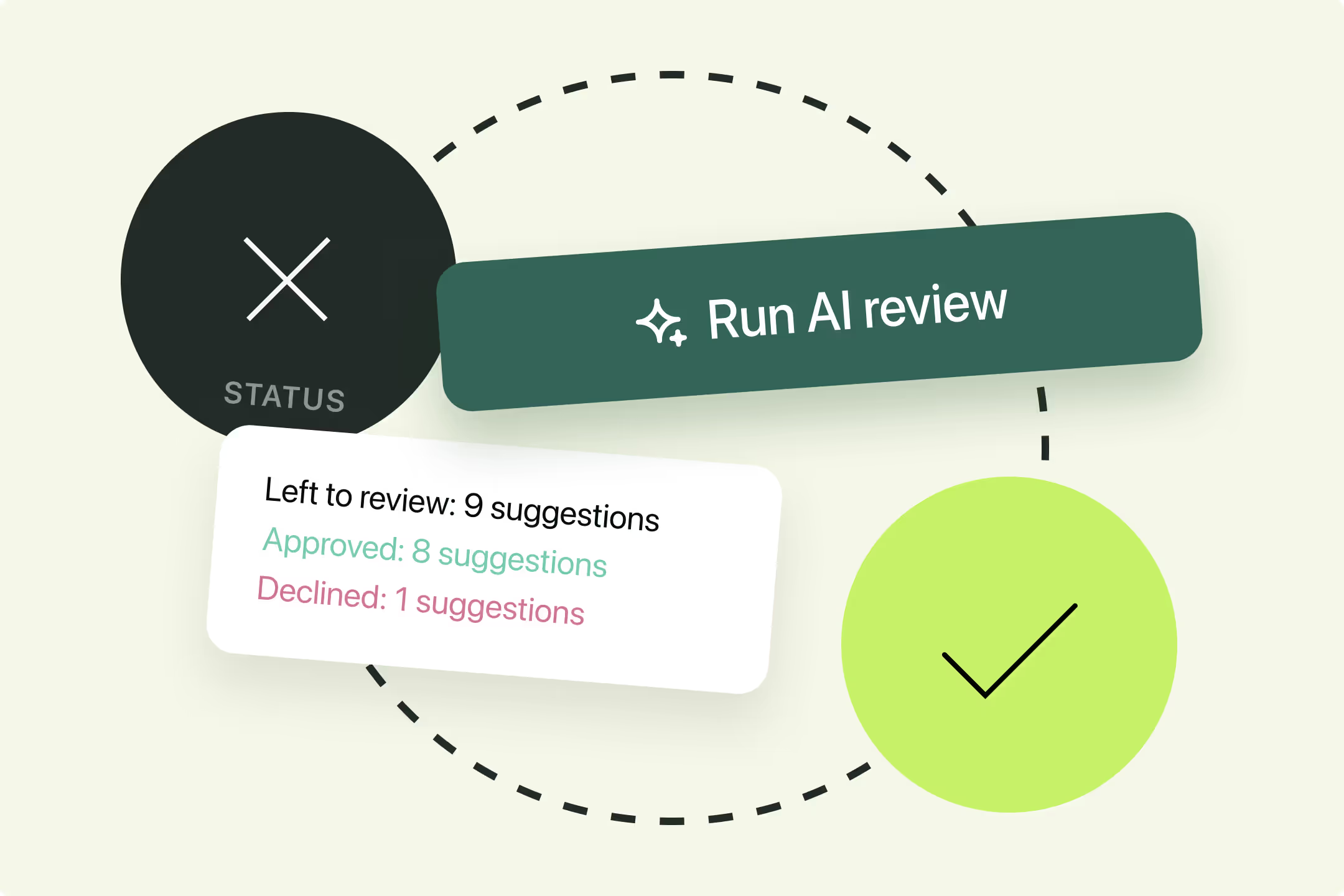
Contract review is a popular use case for legal AI, with our recent survey of in-house lawyers revealing that more than half (58 per cent) have used AI to review contracts in the last year, and a further 40 per cent saying that they’re considering doing so in the near future.
However, our data also surfaced another interesting trend: lawyers remain more reluctant to use AI to redline contracts, with under a third (31 per cent) using AI tools in this way.
The truth is, redlining contracts remains a uniquely challenging task for AI—not because of language understanding alone, but because of the sheer volume and nuance of context required to do it well.
Compare this to more straightforward text interpretation tasks, like data extraction. If you ask AI to find the effective date in a vendor agreement, it needs very little context. It simply looks for patterns—words like “effective” or “date,” combined with characters that resemble a date format—and the task is complete.
But redlining is fundamentally different. To redline effectively, AI needs access to a deeply specific web of contextual knowledge, including but not limited to:
Even subtleties like how aggressive or collaborative the opposing party seems—or how much wiggle room your team has on a given point—can dramatically change how a clause should be marked up.
Only recently, largely thanks to well-designed, intelligently processed playbooks, have contract review tools begun to achieve this goal effectively.
The evolution of contract review software has mirrored the rise and maturation of AI itself.
The earliest wave of AI contract review solutions were largely rules-based engines. They offered basic clause identification and risk flagging, typically through keyword matching and fixed if/then logic. While helpful for triaging high-volume contracts like NDAs, these tools were brittle and struggling with nuanced language or contextual variations.
As machine learning matured, some contract review platforms began incorporating clause extraction models and probabilistic scoring to improve issue spotting. These tools promised smarter redlining and playbook-based mitigation. But sophistication varied wildly:
Accuracy improved, but legal teams still had to double-check outputs and replicate much of the work in their CLM due to the isolated nature of these point solutions.

Today, a new generation of contract review software is emerging. The leading tools are agentic systems—AI tools that don’t just spot risks, but actually take intelligent actions based on your organisation’s context and are embedded firmly in your existing workflows and systems. At Juro, we’re calling this new era intelligent contracting.
This new standard of AI contract review software is:
{{quote1}}
With these developments in mind, we've compiled a detailed list of the leading contract review solutions for legal and business teams in 2026, sharing everything from their key review functionality to what real customers think, and how they differ in practice.
Juro’s AI-powered contract review agent now allows third-party contracts to be reviewed and redlined against your contract playbooks. This is available in Juro, Slack, Microsoft Teams, and Microsoft Word, making this fully automated contract review functionality accessible where your teams already work.
Juro’s AI agent analyzes the contract, highlights risks and deviations from standard terms, and then redlines problematic clauses by proposing a fallback position along with reasoning.
Unlike many other AI contract review platforms, Juro’s review agent is embedded in the places your teams already work, but also within Juro, meaning you can have the agility and sheer power of AI agents, and the peace of mind that comes from an underlying system of record and contract repository.
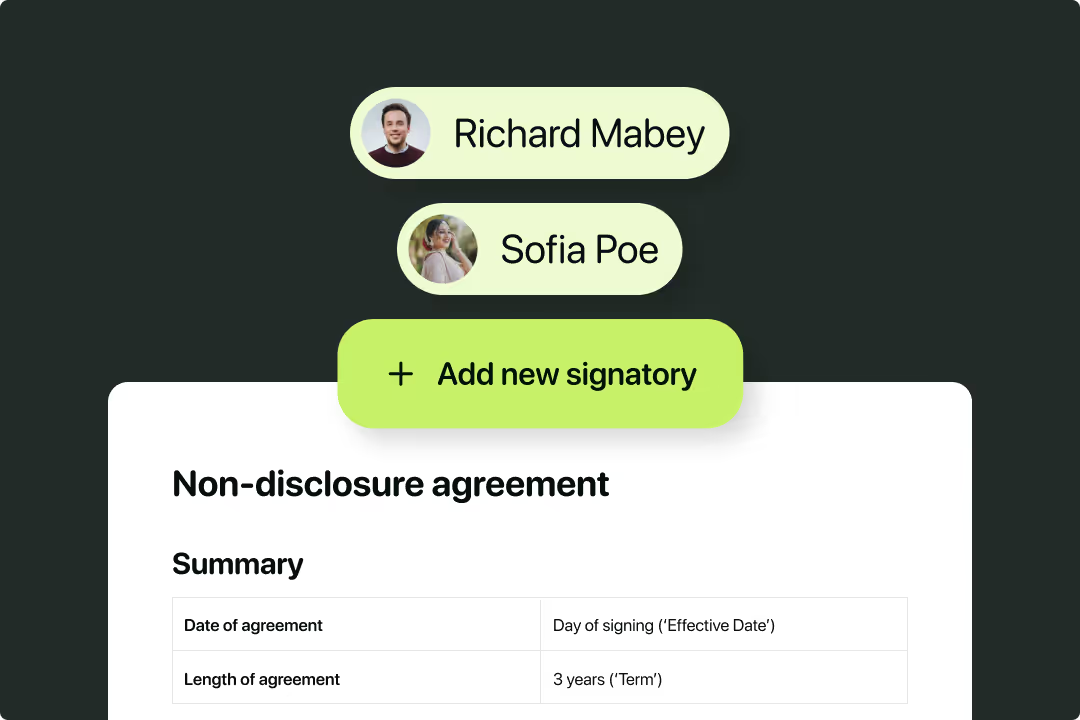
Juro is rated 4.6 out of 5 on G2 at the time of writing, with legal teams sharing that “the AI tool has saved a ton of time with third-party contract reviews” and that “Juro has helped engage business partners in the legal review process”.
“We're consistently impressed by how the system continues to evolve and add further value. We're now able to upload client contracts and get an immediate overview highlighting key areas to review based on the parameters we've set” - Legal Operations Lead, G2 review
Juro’s customers include Trustpilot, Pfizer, Deliveroo, SoundCloud, WeWork, Remote, AJ Bell, Genius Sports, Quantumscape, and many more. Check out Juro’s customer stories to discover how teams like yours are already benefitting from the platform.
Juro is best for lean legal teams in modern businesses facing growing contract volumes. It's designed to help the business self-serve from the tools they already live in with powerful AI while legal stays in control of the process.
If that sounds like something you'd benefit from, hit the button below to see it in action.

LEGALFLY is a secure legal AI associate for in-house legal teams who want to review contracts faster without sacrificing accuracy, confidentiality, or control. Designed for real-world legal work, it takes into account every clause, the governing law, and any disclosures.
It reviews contracts clause by clause, flagging risks, deviations, and omissions while adapting checks to the applicable jurisdiction. Sensitive client and counterparty data is automatically anonymised before review. Integration with Microsoft Word means legal teams can work from the tools they already use.
Outputs are structured and practical, surfacing clear issue lists, clause comparisons, and suggested redlines that map directly to playbooks. Built with an agentic approach, LEGALFLY carries out reviews independently once given direction, while providing reasoning in plain legal terms so teams keep full control over final decisions.
Customers report 8x faster contract reviews, review times reduced by over 90%, and a 50% increase in legal capacity. Others have used LEGALFLY to launch new client-facing services, expanding what their legal team can deliver without extra headcount.
On Capterra, users praise its ease of use, responsive customer service, and value as an “AI co-pilot” for legal professionals. One GC described it as a “trusty sidekick in the legal world.”
Another said “the review functionality has significantly improved my work processes, allowing me to analyse documents faster and more accurately.” Users highlight its ability to automate manual processes, improve efficiency, and enrich legal analysis.
LEGALFLY is used by legal teams across industries including brewing, food production, finance, and professional services. Customers such as Duvel Moortgat, Agristo, The PIF Group, ECS, and Vandelanotte report major efficiency gains.
LEGALFLY is best for in-house legal teams in regulated industries that need fast, accurate, and privacy-first contract review with jurisdiction-specific insight and Microsoft integration.
ThoughtRiver is an AI-driven contract acceleration platform designed to streamline contract review processes. It uses advanced natural language processing and machine learning algorithms to swiftly analyze contracts, extract vital information, and identify risks, ensuring rapid and consistent reviews.
The platform proudly shares the efforts it takes to improve accuracy, including that their legal knowledge base was pre-trained with more than 2,000 questions to ensure informed decision-making during the review process.
Notably, ThoughtRiver does not fall into the contract management software category, though This is because it doesn’t offer value at every stage of the contract lifecycle. Instead, it focuses on that review phase.

Unfortunately, ThoughtRiver doesn’t have any G2 reviews at the time of writing, and only one review on Capterra.
ThoughtRiver’s customers include Shoosmiths and Foley & Lardner LLP, with both law firms sharing their customer stories. However, ThoughtRiver is promoted as being used across several departments, including finance, HR, procurement, and more.
Based on ThoughtRiver’s existing customer stories, the platform appears to be best for legal teams at corporate or law firms interacting with sales and procurement deals that want to improve velocity.
Robin AI is a legal technology platform that leverages artificial intelligence to streamline contract review, analysis, and management for legal teams. By integrating large language models with proprietary machine learning algorithms, Robin AI enables users to review contracts faster, identify risks, and generate reports efficiently.
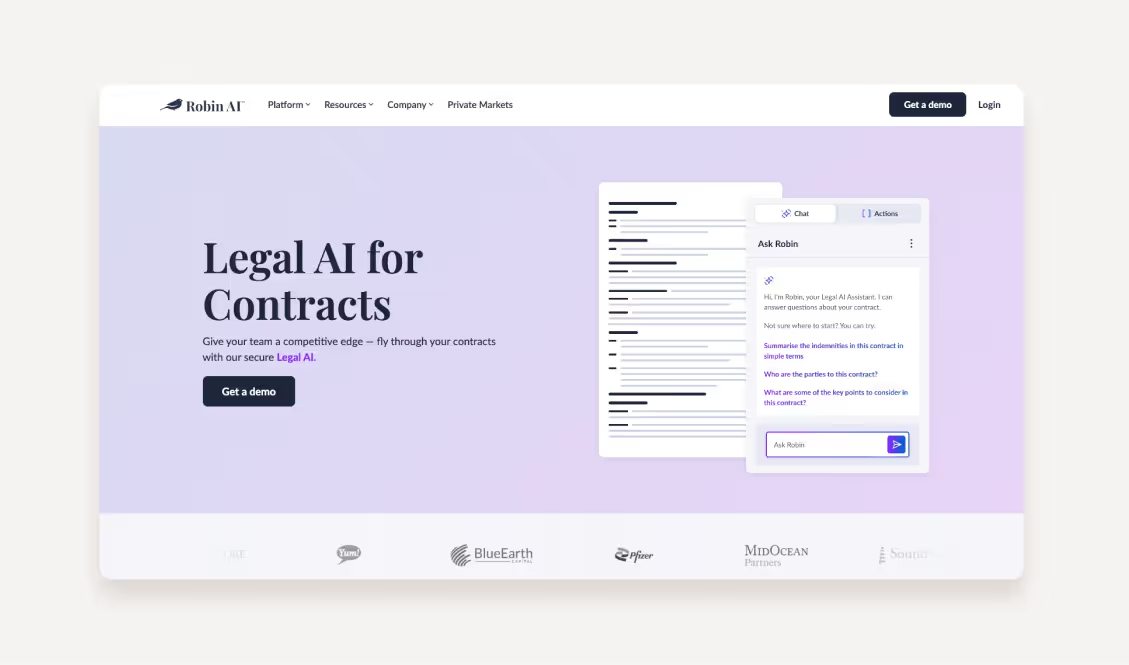
RobinAI’s customers include General Electric (GE), KPMG, Blue Earth, UCIM, Convex Insurance, and more.
RobinAI is rated 4.6 out of 5 on G2, but with significantly fewer reviews than some other vendors like Juro.
Users frequently praise the platform for driving time-savings and making automation accessible. However, some independent reviews indicate that the platform “often misunderstands the phrasing of legal theory”, while several others flag that the platform is missing other key integrations beyond Microsoft Word.
Based on RobinAI’s existing customer stories, it’s clear that the platform is popular amongst private equity firms, biotech, pharmaceutical companies, large corporates, and law firms.
Kira is an AI-powered contract analysis platform acquired and further developed by Litera, designed to streamline the review and analysis of contracts and legal documents. It leverages machine learning to identify, extract, and analyze key information from contracts, enhancing efficiency and accuracy in legal workflows.
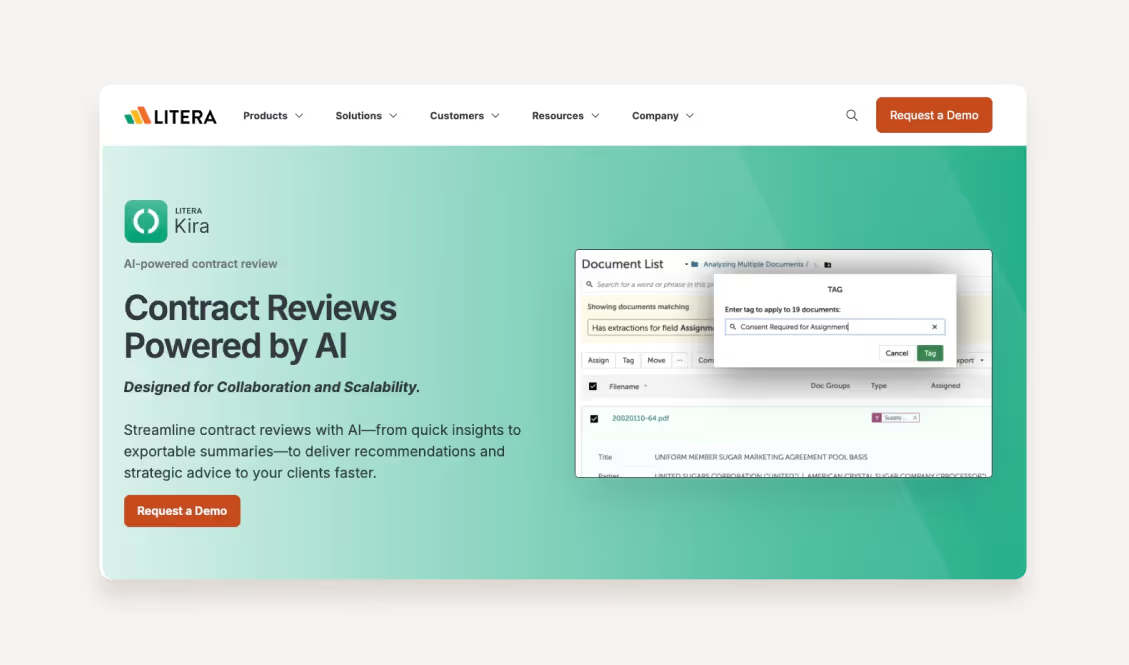
Kira is rated 4.3 out of 5 on G2, but with fewer reviews than some other vendors such as Juro. Interestingly, many of these reviews are more dated than those for other vendors, too.
That said, data extraction is one of the most popular use cases according to independent reviews, particularly in the context of due diligence.
Litera’s Kira is typically adopted by law firms in particular, rather than by in-house legal departments at fast-growing companies. However, the company says they do serve some corporates, too.
Summize is a Contract Lifecycle Management (CLM) solution designed to unite legal teams and business stakeholders so everyone can work better with contracts. It makes digital contracting processes simpler and smarter, from contract requests to the repository.
In particular, Summize offers SIA, an agent that uses your legal guardrails to review, analyze, and redline your contract within Microsoft Word, similar to Juro’s agent. It can also function as a legal AI chatbot designed to answer questions about your contracts.
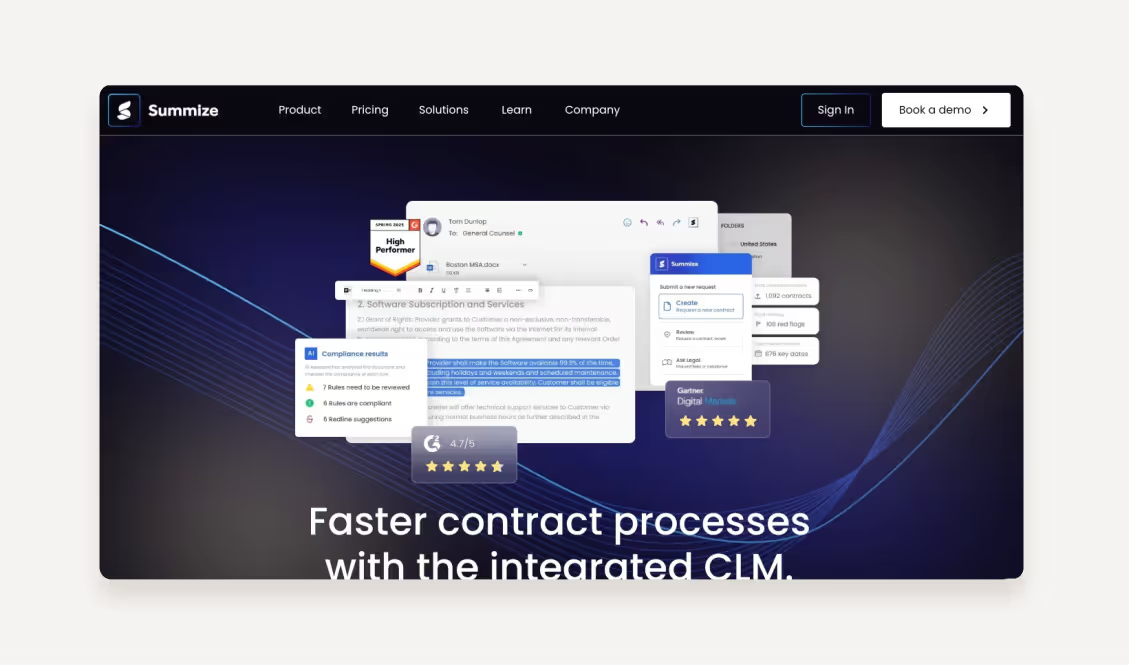
Summize is rated 4.7 out of 5 on G2 but with roughly half the number of reviews and testimonials left by Juro users.
Users often enjoy the AI review functionality but offer suggestions to improve the document upload workflows, contract repository functionality, and the contract request process.
Summize’s customers include Elior, Ikon Science, Lucas Oil, IONITY, and more.
Based on Summize’s existing customer stories, it’s clear that the platform is adopted by legal teams across industries like manufacturing, biotechnology, real estate development, and more.
Luminance is an advanced AI-powered legal technology platform that transforms contract management through its proprietary Large Language Model. Developed by Cambridge mathematicians, it automates contract generation, analysis, and negotiation for over 700 organizations worldwide.
Lumiance’s AI review functionality is called Legal-Grade, and it specializes in review along with post-execution analysis of contracts. However, it does not offer functionality for the pre-signature stages of the lifecycle that occur before redlining.
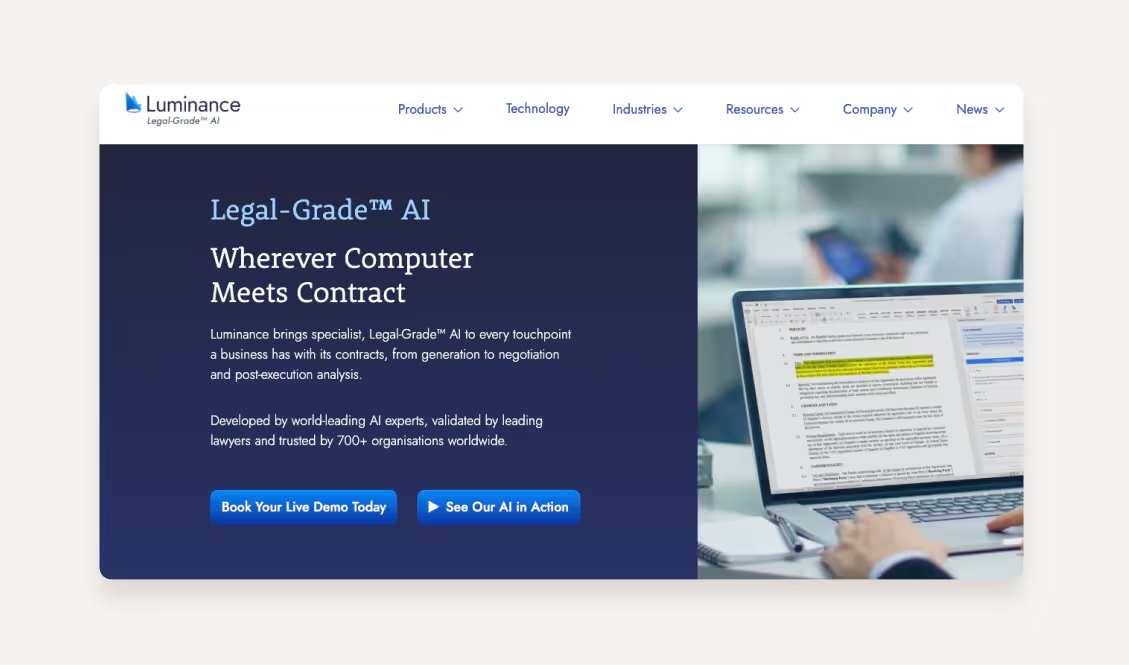
Luminance is rated highly at 4.9 out of 5 on G2, but this was only based on five reviews at the time of writing. The software also has no reviews on Capterra yet.
Luminance’s customers include law firms such as Bird & Bird and Clyde & Co, along with some large enterprises like LG.
Luminance is best for large law firms, professional service firms, and global enterprises in regulated industries.
Of course, you also have general purpose AI tools that are typically adopted by the wider business. But how do they fare for contracting in particular?
ChatGPT can assist with reviewing contracts, but it’s not a recommended solution. There are two main reasons for that:
That said, when approached with care and precision, there are several ways legal teams can use ChatGPT in their day-to-day operations, particularly if they are yet to secure investment in legal tech. We even have some popular prompts shared by fellow lawyers.
Contract review software has come a long way from rigid rule-based systems to intelligent AI agents that understand your business, context, and playbooks. As legal teams face increasing pressure to do more with less, these tools are no longer optional—they’re essential.
Whether you need advanced redlining, risk detection, or seamless integration with platforms like Slack and Microsoft Word, there’s a growing ecosystem of AI-powered solutions to choose from. Platforms like Juro are leading the charge by embedding intelligent agents directly into workflows, enabling faster, more accurate contract reviews without sacrificing control or compliance.
As you plan your legal tech stack for 2026 and beyond, the right contract review software won’t just speed up legal work. It will empower your entire business to move faster with confidence.
Ready to see it in action? Book a demo with Juro and discover how intelligent contract review can transform your workflows.
Lorem ipsum dolor sit amet, consectetur adipiscing elit. Suspendisse varius enim in eros elementum tristique. Duis cursus, mi quis viverra ornare, eros dolor interdum nulla, ut commodo diam libero vitae erat. Aenean faucibus nibh et justo cursus id rutrum lorem imperdiet. Nunc ut sem vitae risus tristique posuere.

